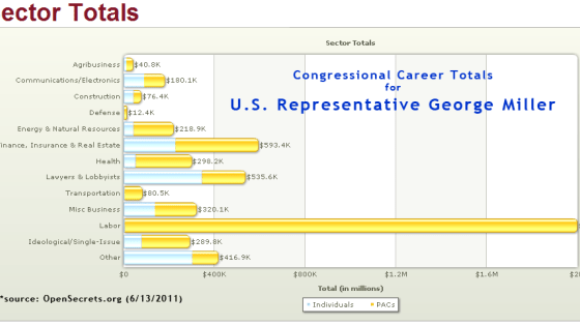Big Labor Puppets Defend Puppet Masters
What do those fighting back criticism of the National Labor Relations Board (NLRB) have in common? Most are fueled by political contributions from union bosses. The Hill newspaper…

What do those fighting back criticism of the National Labor Relations Board (NLRB) have in common? Most are fueled by political contributions from union bosses. The Hill newspaper…
Right To Work freedom strongly linked to economic prosperity explains Vincent Vernuccio in his Townhall post: The NLRB’s complaint is in fact a back-handed compliment to right-to-work laws, because it is based on the assumption that right-to-work laws help attract businesses. The preponderance of the evidence favors that position. As Arthur B. Laffer and Stephen Moore recently noted in the Wall Street Journal, from 2000 to 2009 right-to-work states “grew faster in nearly every respect than their union-shop counterparts: 54.6% versus 41.1% in gross state product, 53.3% versus 40.6% in personal income, 11.9% versus 6.1% in population, and 4.1% versus -0.6% in payrolls.” A recent analysis by the office of Senator Jim DeMint (R-S.C.) shows that right-to-work states created 1.3 million more jobs in the private sector, had 3.5 percent faster income growth, and 46 percent higher business growth than forced union states between 1993 and 2009. And, according to a recent National Right to Work Committee analysis of Department of Labor data, over the past 10 years, the top five states in creating new jobs are right-to-work states, while the bottom five are forced unionism states. Workers in right-to-work states also have more disposable income than those in forced unionism states. In right-to-work states, unions must demonstrate to workers that their service has value or they will refuse to join. As in other areas of the economy, competition makes providers of goods and services—in this case the representation services of labor organizations—more efficient and responsive.
Sixteen state attorney generals try to stand-up to the Obama NLRB attempt to trample states' rights hours after the NLRB rejected efforts by Boeing employees to be heard. From Associated Press reporter Meg Kinnard: COLUMBIA -- Attorneys general from South Carolina and 15 other states Thursday weighed in on a lawsuit filed by the National Labor Relations Board, alleging that its complaint against Boeing for building an assembly plant in North Charleston after a strike by Washington state workers hurts states' abilities to keep manufacturing jobs. Alan Wilson and Greg Abbott, the attorneys general in South Carolina and Texas, respectively, asserted in a brief that "the NLRB's proposed action will harm the interests of the very unionized workers whom the general counsel's Complaint seeks to protect." "State policymakers should be free to choose to enact right-to-work laws -- or to choose not to enact them -- without worrying about retaliation from the NLRB," the two officials wrote. "It is logical that some employers will simply avoid creating new jobs or facilities in non-right-to-work States in the first place." The brief also was signed by attorneys general in Alabama, Arizona, Colorado, Florida, Georgia, Idaho, Kansas, Michigan, Nebraska, Oklahoma, South Dakota, Utah, Virginia and Wyoming. It points out that the attorneys general represent right-to-work and unionized states, although only two of the signers -- Colorado and Michigan -- fall into the latter category. South Carolina is a right-to-work state where individual employees can join unions voluntarily, but unions cannot force membership across entire worksites.

Could worker freedom from union compulsion come to Michigan? It looks like only Republicans can stop it: Click image to contact Sen. Randy Richardville (R-MI 17th District) ANN ARBOR, Mich. -- Republicans in Gov. Rick Snyder's own backyard are urging the GOP chief executive, state Senate Majority Leader Randy Richardville, R-Monroe, and other area legislators to support enactment of a state Right to Work law that would protect employees from being forced to join or pay dues to a labor union as a condition of employment. The Washtenaw County Republican Executive Committee Thursday night -- by vote -- adopted a resolution proposed by the Willow Run Tea Party Caucus saying a Right to Work law will "guarantee individual freedom of choice and help attract and create new jobs in Michigan." "No person (should) be required as a condition of obtaining or continuing public-sector or private-sector employment to: resign or refrain from membership in, voluntary affiliation with, or voluntary financial support of, a labor organization, (or) become or remain a member of a labor organization, or pay any dues, fees, assessments, or other charges of any kind or amount...to a labor organization," the resolution said. Judy McCoy, a member of the GOP committee, said Right to Work legislation "is a civil rights law that will protect employees from job discrimination on the basis of union membership or financial support. No employee should be discriminated against and fired for choosing to join or support a union, or for choosing not to. Every person should be free to choose either way without fearing loss of their job." "With overwhelming Republican majorities in both houses, and a Republican in the governor's office, the only people in Lansing who can prevent Michigan from passing a Right to Work law are, obviously, Republicans," McCoy said.

From the National Right to Work Legal Defense Foundation: Obama NLRB to South Carolina Boeing Employees: “You Have No Stake in Your Jobs” National Right to Work Foundation attorneys continue to help workers save their jobs…

From the National Right to Work Legal Defense Foundation: Obama NLRB to South Carolina Boeing Employees: “You Have No Stake in Your Jobs” National Right to Work Foundation attorneys continue to help workers save their jobs…

Why the “Live Free or Die” state may continue to be mired in compulsory unionism according to the New Hampshire Watchdog’s Grant Bosse: Right-to-work Big Labor's Governor John Lynch endorses compulsory dues The new dynamic has revealed itself most directly…

Virginia’s stalwart Attorney General Ken Cuccinelli is monitoring attempts by the Washington DC airports authority to require union-only labor and will file suit if a “project labor agreement” were put in place,…

Right to Work: Spider Senses Tingling From the Foster's Daily Democrat State Rep. Steve Vaillancourt makes the case for enacting Right to Work: Until the last few weeks, right to work has always been a close call for me. In years past, I have opposed the bill after buying into the argument that one should not benefit from union contracts unless one pays the cost of negotiating them. It was a close call because then as now, I believe the individual should control his or her own life without being coerced into joining anything. Thus, I have always seen a conflict of two principles and have to weigh their importance. This year, with the Daniels amendment, the conflict was removed, and I voted for right to work. It remained a close call, l but the Daniels amendment tipped the scales to supporting the bill. Even with the Daniels amendment gone, I continue to support the right to work bill, and guess what. It's no longer a close call. I'm now a staunch supporter of the bill and urge all my Republican colleagues, especially those who like me have been on the fence in the past, to vote to override the governor's veto. Clearly, unions were using the payment for negotiation argument as nothing more than a red herring. How do I know this? Because, when they refused to budge in their total opposition to the bill, even when the Daniels amendment was added, my Spider senses startled tingling. That's a phrase I use to describe when I begin to realize that I'm being taken for a fool, that those trying to convince me are in fact being less than totally honest.